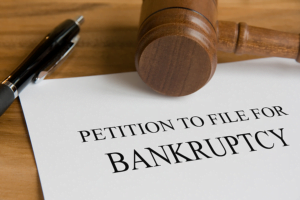Dallas Chapter 13 Attorneys
 If you are in a difficult financial situation, but are unsure of what to do, Chapter 13 bankruptcy might be right for you. Bankruptcy is a tool that can help you manage your debts and regain control of your finances. If you have enough disposable income that you can make reasonable payments on your debts, then Chapter 13 can provide you with a solution.
If you are in a difficult financial situation, but are unsure of what to do, Chapter 13 bankruptcy might be right for you. Bankruptcy is a tool that can help you manage your debts and regain control of your finances. If you have enough disposable income that you can make reasonable payments on your debts, then Chapter 13 can provide you with a solution.
Call Allmand Law Firm, PLLC today at 214-884-4020 to find out how a Chapter 13 bankruptcy attorney can help you.
Is Chapter 13 Bankruptcy Right for Me?
While Chapter 7 bankruptcy liquidates unsecured debt, Chapter 13 bankruptcy, also known as “reorganization bankruptcy,” gives the filer the chance to restructure their debt into manageable payments over a longer period of time – typically three to five years. In order to qualify for Chapter 13 bankruptcy, you must have some form of income, and your wages must be sufficient to fund your repayment plan.
Filing for Chapter 13 bankruptcy can have many benefits, including the following. You:
- Will repay your debts over three to five years
- May be able to remove a second or third mortgage
- May be able to save your home from foreclosure
- Can put an immediate end to creditor harassment
- Can move forward with a fresh financial start
It can be difficult to determine whether Chapter 13 bankruptcy is right for you. However, a debt management lawyer can review your specific situation and help you understand your legal rights.
How to Stop Foreclosure Through Chapter 13
Chapter 13 bankruptcy allows you to reorganize your debts so that you can avoid repossession and/or foreclosure. If you are receiving foreclosure notices or you have fallen behind on your mortgage, Chapter 13 could be a powerful tool to help you regain control of your finances. The moment you file for bankruptcy, an automatic stay is put into place, which halts foreclosure proceedings and other debt collection methods.
The Chapter 13 Bankruptcy Timeline
Step #1: You must take a credit counseling course within 180 days of filing.
 Every person who files for Chapter 13 bankruptcy must complete an approved credit counseling course prior to filing for bankruptcy. You must take the course from an agency approved by the U.S. Trustee’s Office. The session will help you understand your situation and make sure you have income sufficient enough to repay creditors over time. The course may cost between $25 and $35, but that fee may be reduced or waived if you cannot afford it.
Every person who files for Chapter 13 bankruptcy must complete an approved credit counseling course prior to filing for bankruptcy. You must take the course from an agency approved by the U.S. Trustee’s Office. The session will help you understand your situation and make sure you have income sufficient enough to repay creditors over time. The course may cost between $25 and $35, but that fee may be reduced or waived if you cannot afford it.
Step #2: Once you file under Chapter 13, the automatic stay will go into effect.
You must pay bankruptcy filing fees and submit specific forms to file your Chapter 13 bankruptcy. Then, a court will issue an automatic stay order that will notify your creditors to stop all collection efforts. If you have filed bankruptcy once or more within the last year, you may not get an automatic stay, or it may be limited. Once the Chapter 13 automatic stay is in place, all foreclosures, repossessions, and other collection efforts must pause.
Step #3: You will submit your payment plan to the bankruptcy court for approval.
You will work with your Chapter 13 bankruptcy attorney to establish a payment plan that you feel is reasonable for your specific situation. It can be difficult to know how much of a payment will be manageable for you. A careful assessment of your finances and work through the credit counseling courses can help.
Step #4: About 20-40 days after you file, the creditors meeting will take place.
The meeting of the creditors is a hearing where your trustee, attorney, and any creditors who wish to attend will gather and discuss your Chapter 13 bankruptcy. It can be intimidating to know that everyone will be discussing your situation; however, keep in mind that this is a part of the process that everyone encounters. Creditors rarely appear at the meeting of the creditors. Your attorney can help you review information and answer questions.
Step #5: A confirmation hearing will be held 20-40 days after the creditors meeting.
The bankruptcy court will review your proposed payment plan and if it meets necessary requirements, then it will be confirmed. Necessary requirements include the following. Your payment plan must:
- Be feasible in that you have enough income to pay creditors as proposed.
- Be made in good faith, and you cannot be manipulating the bankruptcy process.
- Comply with bankruptcy law, including precedence of creditors and priority debts.
Step #6: You must complete secondary counseling after the creditors meeting.
All Chapter 13 bankruptcy filers must complete a second credit counseling course during the bankruptcy process. This course will help you understand how to budget and get back on your feet after bankruptcy.
Step #7: You will start to repay your debts each month for three to five years.
Your payment play should be effective immediately, and you will repay debts over the next three to five years. However, if your finances change and you need to modify your payment plan or change your Chapter 13 bankruptcy to a Chapter 7, you may be able to do that with the help of a skilled attorney.
Step #8: At the end of your bankruptcy, remaining debts will be discharged.
You will pay many of your debts over the course of your payment plan; however, any debts that are not paid may be discharged. There are certain types of debts, such as child support and some taxes, that bankruptcy cannot discharge. However, most of your unsecured debt will be eliminated once your Chapter 13 bankruptcy is done.
Am I Eligible for Chapter 13 Bankruptcy?
 Unlike Chapter 7 bankruptcy, you are not required to pass a “means test” in order to file for Chapter 13 bankruptcy; however, you should know that eligibility is still limited. In order to qualify for Chapter 13, you must be able to show the bankruptcy court that you have sufficient income to meet your repayment obligations — that is, after you subtract any required payments on secured loans, like mortgage payments or car payments.
Unlike Chapter 7 bankruptcy, you are not required to pass a “means test” in order to file for Chapter 13 bankruptcy; however, you should know that eligibility is still limited. In order to qualify for Chapter 13, you must be able to show the bankruptcy court that you have sufficient income to meet your repayment obligations — that is, after you subtract any required payments on secured loans, like mortgage payments or car payments.
You can use income from any of the following to fund your plan:
- Wages / salary from your job
- Income from self-employment
- Social Security or disability benefits
- Workers’ compensation benefits
- Unemployment benefits or welfare
- Child support or spousal support
- Proceeds from property sales
In order to be eligible for Chapter 13 bankruptcy, you must also meet debt limit requirements. Your secured and unsecured debts cannot exceed a certain amount, which changes each year. Secured debt is that which is linked to specific property, such as a house or car. Creditors may have a right to take back that property if they do not receive payment. Unsecured debt is that which is not linked to specific property, such as medical bills and credit cards. If your debt amounts are higher than the limits specified by law, then you may have to file a different type of bankruptcy, like Chapter 11.
You must be an individual in order to qualify for Chapter 13 bankruptcy. You cannot be a business. However, if you are an individual with business debt in your name, then you can include that debt in your bankruptcy. Business-related debt may be part of the debt that you reorganize through Chapter 13 bankruptcy.
Free Consult With a Dallas Chapter 13 Bankruptcy Attorney
Get in touch with our Dallas Chapter 13 bankruptcy lawyer from Allmand Law Firm, PLLC to discuss all of your options, including bankruptcy. Our founder, Attorney Reed Allmand, is certified in Consumer Bankruptcy by the Texas Board of Legal Specialization. Over the years, our firm has helped tens of thousands of individuals and families eliminate their debt and reset their financial health. Now, we are ready to help you.
Call our Dallas bankruptcy attorneys at (214) 884-4020 to schedule an appointment. Your complimentary financial empowerment session is just a phone call away!